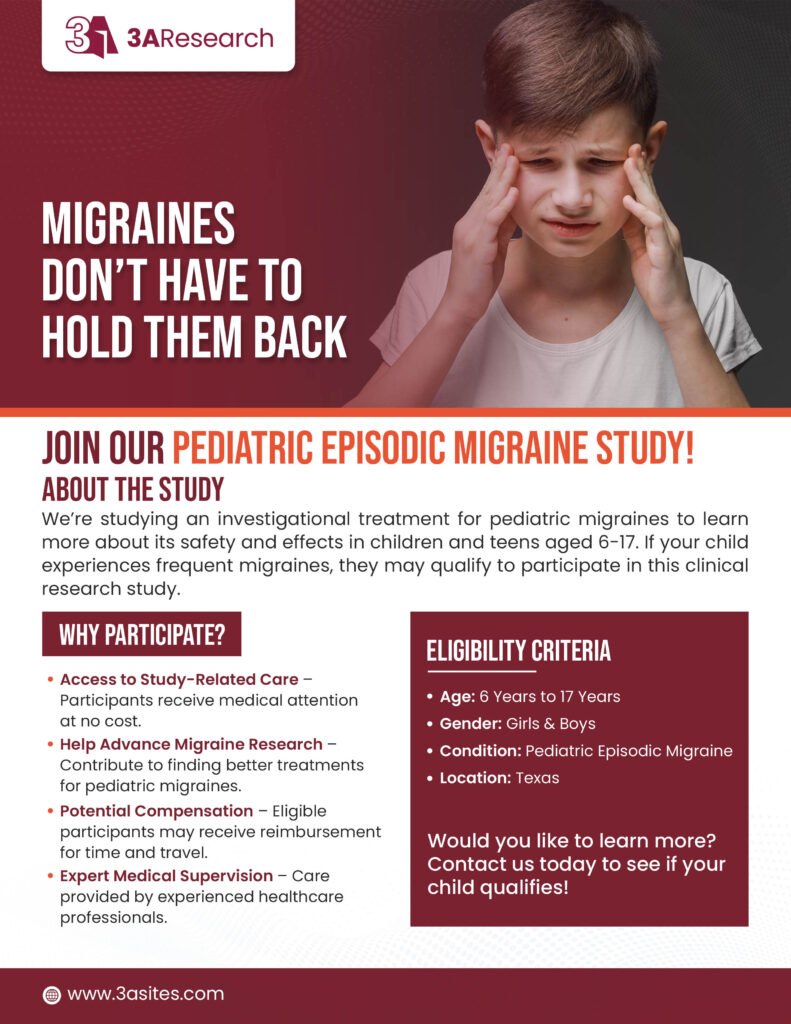Advancing Pediatric Episodic Migraine Clinical Trials
Migraine can be overwhelming, especially for children and teens. If your child experiences frequent migraines, Pediatric Episodic Migraine Clinical Trials in El Paso, TX may offer an opportunity to contribute to research. Learn more about how clinical studies explore investigational treatments of pediatric migraine and see if your child qualifies.
Application for Current Clinical Research Study

Pediatric Episodic Migraine
Pediatric Migraine: More Than Just a Headache
Pediatric migraine is more than just a headache—it can be a debilitating condition that affects daily life, school performance, and overall well-being. Symptoms may include throbbing pain, nausea, sensitivity to light or sound, and fatigue. While some children find ways to manage their migraines, others struggle to find relief.
That’s why research is essential. Migraine Clinical Trials aim to expand our understanding of headache disorders and explore investigational treatments of pediatric migraine. Participating in a pediatric migraine research study in Texas allows families to contribute to important medical advancements while receiving study-related care from medical professionals.
If your child experiences frequent migraines, consider learning more about clinical trials for episodic migraine and how research may help shape future treatment options.
Important Information About Clinical Trials
Participation in episodic migraine clinical trials is voluntary. These studies evaluate investigational treatments of pediatric migraine and follow strict safety protocols. Outcomes may vary, and participation does not guarantee symptom relief. If you are considering enrolling in a pediatric migraine research study in Texas, consult with a healthcare professional to determine if it is a good fit for your child.
Girls and Boys

Age
6 Years to 17 Years

Gender
Girls & Boys

Condition
Pediatric Episodic Migraine

Location
Texas

About Pediatric Episodic Migraine Study
A migraine is a strong headache that usually affects one side of the head and may cause throbbing pain, nausea, vomiting, and sensitivity to light or sound. While many treatments exist for adults, options for children under 18 are limited. This study focuses on evaluating the long-term safety of an investigational drug in children and teens (ages 6-17) with migraines.
The investigational drug is an FDA-approved migraine treatment for adults and is now being tested in younger participants. This Phase 3 study includes children with episodic or chronic migraines. Participants will visit clinics regularly for health checks, blood tests, and questionnaires to monitor treatment effects. This study requires commitment, as regular medical visits are necessary.
Understanding the Clinical Trial Process
If your child qualifies for pediatric episodic migraine clinical trials in El Paso, TX, they will receive study-related care from experienced medical professionals. Each study follows specific guidelines and procedures. Clinical trials for episodic migraine help researchers gather valuable insights into headache disorders and their management. If you’re interested, explore available research opportunities today.
Enroll Now
[contact-form-7 id=”366ebe8″ title=”Contact form 1″]
Frequently Asked Questions
Get answers to common questions about Atopic Dermatitis Clinical Trials, eligibility, study procedures, and participation benefits.
What are the symptoms of ocular migraines in children?
Symptoms include temporary vision changes (blurry vision, blind spots, flashing lights), headache, eye pain, nausea, and sensitivity to light or sound.
How do you get rid of episodic migraines in kids?
Managing triggers, staying hydrated, maintaining a sleep schedule, avoiding stress, and using prescribed medications can help reduce episodes.
What causes episodic headaches?
Common causes include stress, dehydration, lack of sleep, poor posture, eye strain, and certain foods or weather changes.
What neurological disorders cause migraines?
Conditions like epilepsy, multiple sclerosis, stroke, Chiari malformation, and vestibular disorders can be linked to migraines.
Is pediatric episodic migraine curable?
Migraines can be managed but not cured. Treatments focus on reducing frequency and severity through lifestyle changes and medication.
